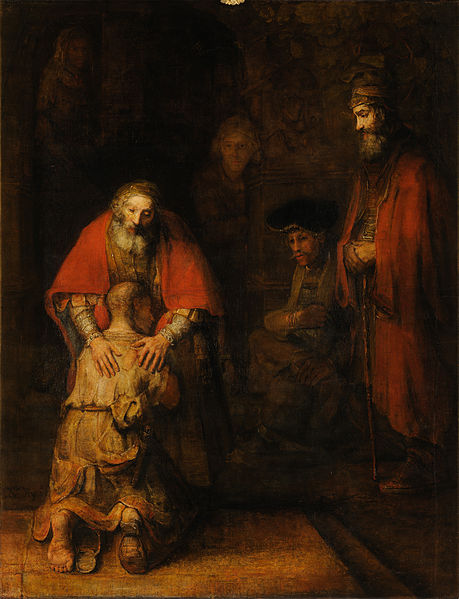So he got up and came to his father. But while he was still a long way off, his father saw him and felt compassion for him, and ran and embraced him and kissed him. And the son said to him, ‘Father, I have sinned against heaven and in your sight; I am no longer worthy to be called your son.’ But the father said to his slaves, ‘Quickly bring out the best robe and put it on him, and put a ring on his hand and sandals on his feet; and bring the fattened calf, kill it, and let us eat and celebrate; for this son of mine was dead and has come to life again; he was lost and has been found.’ And they began to celebrate. (Luke 15:20-24, NASB)
Are you feeling like there’s no hope? Jesus told a story about someone who felt hopeless.
This is the parable of The Prodigal Son. Dr. Luke tells the story: Jesus is hanging out with some sinners (I’m one!), and some Pharisees are grumbling. So Jesus tells some parables. There’s a man with two sons. The younger son asks his father to give him his share of the father’s estate. The son takes the money and runs away, then squanders the money on loose living. He figures his best option is to return to his father, beg forgiveness, and ask to work as a hired hand.
As we see in the passage above, it’s the father who sees the son, then runs to the son with open arms. The son asks for forgiveness, then the father welcomes him back with a celebration! After the text above, the older son finds out what’s going on, and throws a tantrum. The father explains that the younger son has returned and repented, hence the celebration.
Jesus’ story is full of symbolism, and is meant to tweak the Pharisees. The father represents our Father God; the younger son a repentant sinner; and the older son a self-righteous, unrepentant person. Among the takeaways from the story is that no matter what we’ve done in the world, no matter how bad, the Father is willing to forgive us, and/or take us back in His kingdom. But there’s more to the story.

The Return of the Prodigal Son, by Rembrandt van Rign, c. 1661-1669
In the parable, it’s the father who comes running to his son. With arms open wide. He hasn’t given up on his prodigal. It’s the same relationship between us and God: He never gives up on you and me! Whether we’ve strayed in sin, or just haven’t met Him yet, God the Father is running to us, willing to forgive and take us in to His family.
This concept of God reaching out to us is seen in literature and art. In a poem called “The Hound of Heaven,” the author tells of a hound in dogged (pun intended!), never-quit pursuit of a hare. God chases after us in the same way. On the ceiling of the Sistine Chapel at the Vatican is Michelangelo’s famous painting. The center portion, “The Creation of Adam, (shown below)” portrays God and Adam reaching toward each other. At least one commentator has pointed out that it’s God exerting more of the effort. God’s arm is outstretched, while Adam appears to be lazily reaching out.

The Creation of Adam, by Michelangelo, c. 1511
I’m grateful that God hasn’t given up on me! I praise Him for His relentless pursuit of me! Thank you, Father!
Worship: O Come to the Alter, by Elevation Worship

